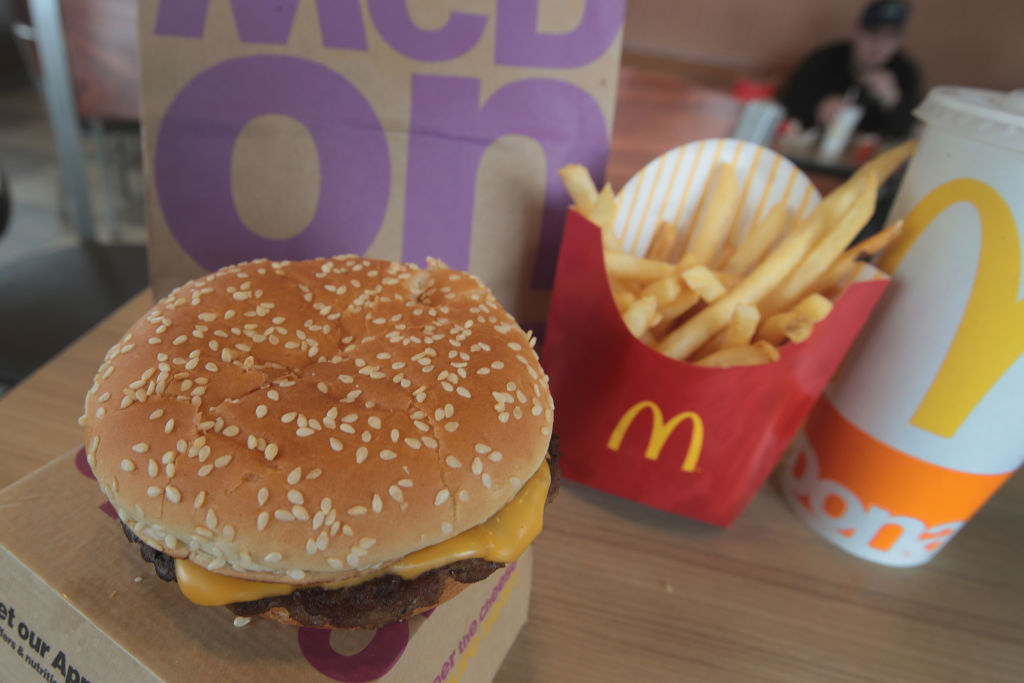
A severe E. coli outbreak tied to McDonald’s Corp.’s Quarter Pounders sickened dozens of people in the U.S., mainly in Colorado and Nebraska, and killed one, the U.S. Centers for Disease Control and Prevention said.
Ten people have been hospitalized, including a child with complications from HUS, a syndrome that damages small blood vessels and can lead to deadly clots, the agency said. Of the people who have been interviewed, all reported eating at McDonald’s before falling ill between Sept. 27 and Oct. 11, the CDC said, with most specifying a Quarter Pounder.
Twenty-six cases have been reported in Colorado, the state’s health department said. One older person with underlying conditions in Colorado has died after contracting E. coli, according to the statement, and state public health officials are coordinating with the CDC.
The restaurant chain’s shares dropped more than 10% in postmarket trading before paring losses. If the current 5.7% decline holds, McDonald’s shares are on pace for their biggest drop since March 2020.
McDonald’s said it was taking “swift and decisive action” to control the outbreak. It removed the Quarter Pounder from restaurants in the affected areas and instructed all local restaurants to remove the slivered onions that it identified as the likely culprit from their supply chains.
“We are working in close partnership with our suppliers to replenish supply for the Quarter Pounder in the coming weeks,” the company said in a statement. All of its other menu items remain available, it said.
E. coli is a bacteria that’s normally found in the intestines of people or animals, and is often harmless. The latest outbreak was caused by a virulent form, and all the infections were tied to the same strain: E. coli O157:H7. Symptoms typically start three to four days after swallowing the bacteria and can include severe stomach cramps, diarrhea and vomiting.
McDonald’s handling of the situation will be critical for how investors respond, according to Citigroup analyst Jon Tower. Key elements involve taking action to control the outbreak, taking responsibility for the situation and over-correcting on food safety messages and investments, he wrote in a note to clients.
“Negative food safety news is never welcomed by restaurants operators, especially those working to improve the brand image after getting off-sides on consumer affordability in recent years,” Tower said.
Read More: Donald Trump’s Long Love for McDonald’s, Explained
The company has removed the Quarter Pounder from restaurants in Colorado, Kansas, Utah and Wyoming, as well as parts of Idaho, Iowa, Missouri, Montana, Nebraska, Nevada, New Mexico, and Oklahoma. It also said that some of the infections may stem from a single supplier of the onions that serves three distribution centers.
The true number of people infected is likely much higher than is currently known and may involve additional states, the CDC said. That’s because many people recover without being tested. The case count may also continue to rise because it takes three to four weeks to determine if a sick person is part of an outbreak, the agency said.
Contaminated food
Major outbreaks can haunt restaurant chains for years. In 2015, an E. coli and norovirus outbreak across Chipotle Mexican Grill Inc. locations in multiple states led to a drastic drop in sales, as well as fines. In August 2022, the lettuce served at hundreds of Wendy’s Co. stores was linked to dozens of E. coli infections in the U.S. Midwest.
It can be spread through contact with contaminated foods, often raw or undercooked meat. It can also be transmitted via fruits and vegetables, which may be contaminated via tainted irrigation water. Cooking typically kills the bacteria.
The CDC said the specific ingredient causing the outbreak hadn’t been identified and investigators were focused on two ingredients: fresh, slivered onions and fresh beef patties. McDonald’s told the CDC it pulled those products and removed Quarter Pounders from stores in the affected states while the investigation continues.
A preliminary analysis by the U.S. Food and Drug Administration suggested the slivered onions were a likely source of the contamination, the agency said. It’s working to confirm the findings and determine if the onions were served or sold at other businesses.
